This article was previously published and has been updated by the Migraine Strong team.
“You need to take less medications to get rid of rebound headaches”, a doctor I have never met before said to me when I was sitting in his office. I had my 2 year old son in a stroller with me. He was whining (my 2 year old, not the doctor) and I was trying to entertain and keep him quiet with a milk bottle and a rattle. I knew what that doctor saw that day. A stressed out, exhausted, mother of a toddler who was pregnant with another child who was over medicating with Excedrin. Of course she’s having constant migraine attacks. She’s in rebound!
But I did not see it that way back then. I wanted a doctor who would make my pain stop. So his suggestion to “take less medications” to feel better fell on deaf ears since taking Excedrin was the only thing that took the edge off the pain and allowed me to function and take care of my child. I left the office that day in pain and disappointment. I continued my spiral into migraine chronification. Is taking Excedrin everyday bad when it’s the only way I can function? I continued with prescription and over the counter medications which were deemed to be pregnancy safe, just to get me through my days with my pregnancy and a toddler.
** While Migraine Strong writes about the latest in migraine treatments, this is not medical advice. We are patient educators and all information you read should be discussed with your doctor.
Pregnancy and migraine
As awful as my first pregnancy was, I was still able to work full time. During the attacks, I had the option to stay home or sleep it off. However, as my hormones raged during my second pregnancy, and I fell deeper into the rebound hole, it was a challenge to manage migraine while taking care of a toddler. Although I still worked occasionally, I mostly came to the office for a break. I was often in the bathroom vomiting because migraine attacks made me nauseous.
By the time my toddler was 2 years old and my daughter was 6 months, I was experiencing daily migraine attacks, vomiting every day, was so weak that I could not walk down the hall without holding on to walls, spending my days on the couch, and unable to work. I was homebound except for doctor appointments. I was anxious and depressed that I would spend the rest of my life in constant pain. I was taking Excedrin Migraine on a daily basis to take the edge off my head pain. I was taking Sumatriptan 10 times a month which left me even weaker and sicker. The triptans and Excedrin were the perfect set-up for rebound headaches.
Searching for help
I was trying different treatments and nothing was working. Preventive medications were failing me. Botox treatment did not work. Acupuncture, physical therapy, injections did not touch my pain. Meanwhile, I grew hopeless.
It was when I accepted that I was suffering from rebound headaches in addition to migraine that it began to make sense why my head pain was so resistant to treatment. Preventive treatments often do not work when we are stuck in the rebound cycle. Most acute medications only fuel rebound headaches. Through the Migraine Strong Facebook Group, I eventually learned how to get rid of rebound headaches. It was not the answer I wanted to hear back then and I am sure it is not what you want to hear now.
What can I take for rebound headaches if I can’t take my usual medications was top on my mind. No Excedrin? No sumatriptan? My doctor helped me answer that question but ideas for evidence-based home remedies for rebound headaches came from my own research (shared below). To get rid of rebound headaches, you must stop the acute medications that got you into rebound. And that’s exactly what I did over 4 years ago. Just the idea of it is scary. Read on and learn from my experience.
What is a rebound headache? Are you “in rebound?”
Approximately 50% of patients with chronic headache have rebound. [i] Rebound headache officially named medication overuse headache (MOH) is caused by excessive use of certain acute (prescribed or over the counter) medications.
The ICHD-3 diagnostic criteria for rebound headaches is as follows:
- Headache occurring on ≥15 days a month in a patient with a pre-existing headache disorder;
- Regular overuse of certain acute medications for >3 months;
- Does not fall within another diagnosis;
Essentially, to be diagnosed with rebound headaches/medication overuse headaches, a person must experience headaches on more than 15 days per month after excessively taking certain acute medications for at least three months.
It’s important to understand that the regular overuse has to last for 3 or more consecutive months or more. Going through a shorter period of time with high use does not meet the criteria.
What medications contribute to rebound headaches?
Rebound headaches are caused by excessive use of certain acute medications. However, the term “excessive” depends on the type of acute medication taken. Each medication class has a specific threshold.
According to American Migraine Foundation, the following situations may cause rebound headaches:
- Triptans (i.e. sumatriptan, rizatriptan) or ergotamine when used on 10 or more days per month for more than 3 months;
- Opioids (i.e. Oxycodone, Tramadol, codeine) when used 10 or more days per month for more than 3 months;
- Combination pain relievers (i.e Excedrin Migraine) when used on more than 10 days per month for more than 3 months; (Although, Fioricet [and Fiorinal] technically fall into this category, they can actually cause rebound headaches when taken four times a month or more according to Dr. Thomas Berk); [iii]
- Simple analgesics (i.e. NSAIDs, aspirin, naproxen, acetaminophen) when used on more than 15 days per month for more than 3 months;
- Caffeine intake of more than 200mg per day.
If you have a headache disorder, any medication you take for pain relief even for a different medical condition can cause rebound headaches.[iv] People without migraine, can take the same pain relieving medications for other conditions such as back or neck pain without triggering rebound headaches. Yes, that last part seems very unfair.
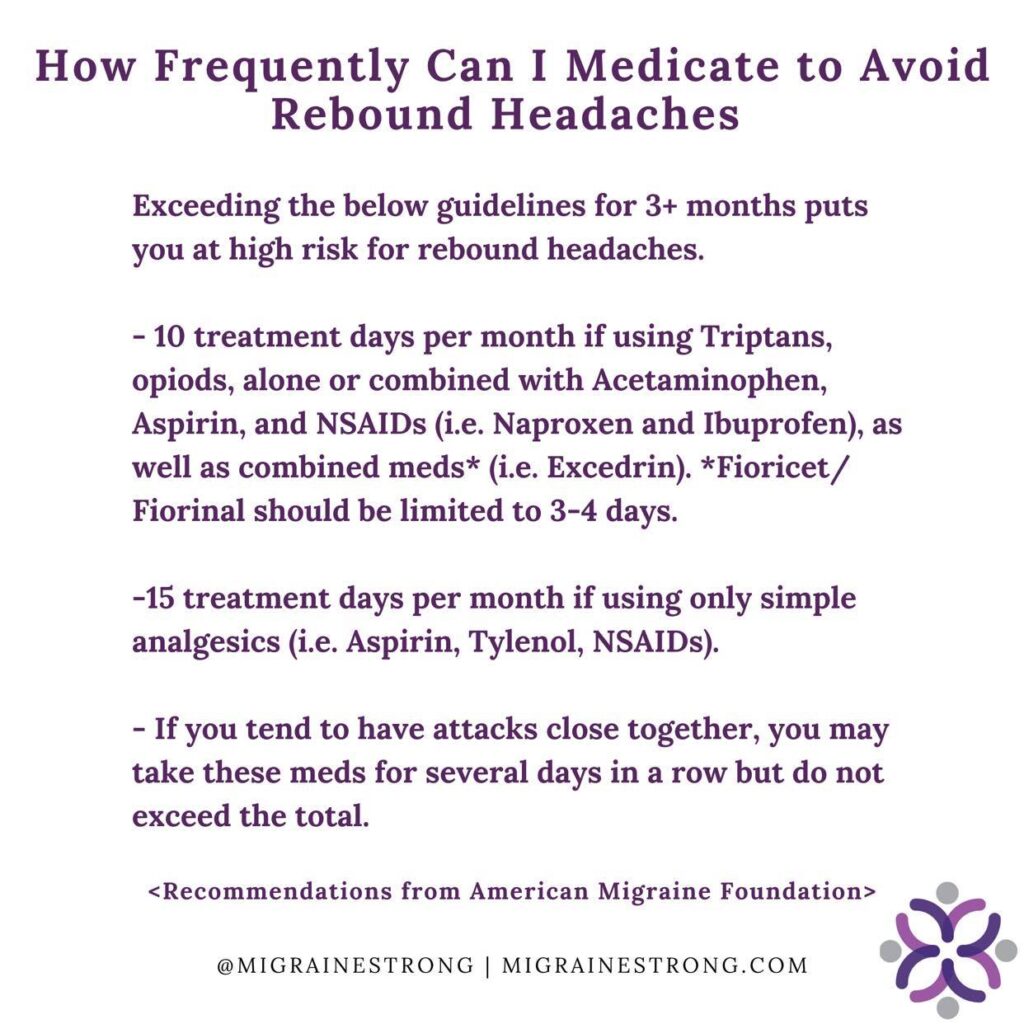
How to stop rebound headaches from starting
Do all you can to prevent them by minimizing your rebound risk. If you are not in rebound but feel that your migraine disease is still not under control, we recommend that you review the Migraine Strong Treatment Pie. Focus on the slices of the pie that need some work.
Here are some ways you can prevent the cycle:
- If you need to take acute medication on more than two days per week or 10 days per month for more than 3 months, contact your doctor to come up with a new treatment plan, perhaps adding a preventive medication or adjusting your current dose;
- Avoid opioids or medications which contain butalbital (ie Fioricet); [v]
- Follow the Treatment Pie;
- Avoid your individual triggers;
- Try non-pharmacologic devices for migraine relief from devices like Cefaly, and Nerivio. There are others but those are most popular right now;
- Try natural and non-pharmacologic migraine remedies like the Allay Lamp, ginger, magnesium and CBD to decreased the number of medicated days;
How to get rid of rebound headaches
If you believe you are suffering from rebound headaches, let me just start by saying that I was once in your shoes. I was successfully able to get through the rebound cycle and believe you can too. Here are some of my suggestions on how to get rid of rebound headaches successfully. Hopefully they motivate you to take the first step necessary to make a change.
1. Join an online migraine community
The turning point for me was finding an online migraine community on Facebook. How to stop rebound headaches is a common question in online communities as it’s such a prevalent problem. It is where I learned that my daily intake of Excedrin Migraine in addition to Imitrex, which I took to help me cope with head pain, was indeed feeding my pain cycle. I also learned that I would need to stop these acute medications to get rid of the rebound headaches. Learning about oral steroids and nerve blocks were some of the options that I could speak to my doctor about on my next visit.
Joining the Migraine Strong Facebook Group filled me with hope that relief was attainable. It also provided me with a network of supportive individuals who related to what I was going through. It empowered me with knowledge and confidence to advocate for myself.
I recall reaching the milestone of being off acute medications for 150 days. I made a post about it in the Migraine Strong Facebook group to celebrate with everyone and to encourage others to take their first step towards getting rid of their rebound headaches. I stopped counting after 150 days, but I stayed off of the medications that triggered my medication overuse headache for longer than that.

Healthline recently launched a Migraine Healthline App. This is another great resource to connect with people who are struggling with migraine. Migraine Strong had partnered with Healthline to launch this app. It’s been exciting to watch this new online migraine support group community grow. We hope you download your free Migraine Healthline App and connect with new friends.
2. Consult your physician
I strongly encourage you to consult your headache specialist or neurologist to develop a plan of how to get rid of rebound headaches. Here are some reasons why this is beneficial.
- A headache specialist can confirm whether you are in fact experiencing rebound headaches.
- A headache specialist can advise you about the safest way to stop the acute medications that are being overused. Although some medications can be discontinued abruptly, others may need to be tapered slowly. Some people may even benefit from discontinuing medications in an inpatient setting if it is an option.
- A headache specialist can offer oral steroids, DHE infusions, or occipital nerve blocks to decrease the severity and frequency of migraine attacks. This increases the chances of successfully being able to get rid of your rebound headaches. All neurologists should be skilled enough to know how to stop rebound headaches cycles, but sometimes the expertise of a certified headache specialist is needed.
- Your headache specialist can provide you with a list of medications which are safe to take during the ‘washout’ process, such as Zofran, Phenergan, Reglan and Benadryl. These medications are not associated with a risk of rebound. Furthermore, he can also advise about the new anti-CGRP drugs which do not cause rebound. (ie: Ubrelvy, Nurtec).
When I finally realized and accepted that I was experiencing rebound headaches 4.5 years ago, my first stop was my headache specialist’s office. When I met my doctor, she confirmed that in addition to chronic migraine, I was also suffering from rebound headaches/medication overuse headaches from Excedrin and Sumatriptan. I regained control and learned how to stop the rebound headaches so my underlying chronic migraine could be effectively treated.
After the appointment we decided on the following: I was prescribed a steroid (Medrol dose pack for migraine); I was given a referral to a neurologist for occipital nerve blocks and a referral for chiropractic treatment; I also left with a letter from my doctor with a treatment plan in case I needed to go to an emergency room. All of these treatments significantly helped to lower my pain levels while I stopped all my acute medications.
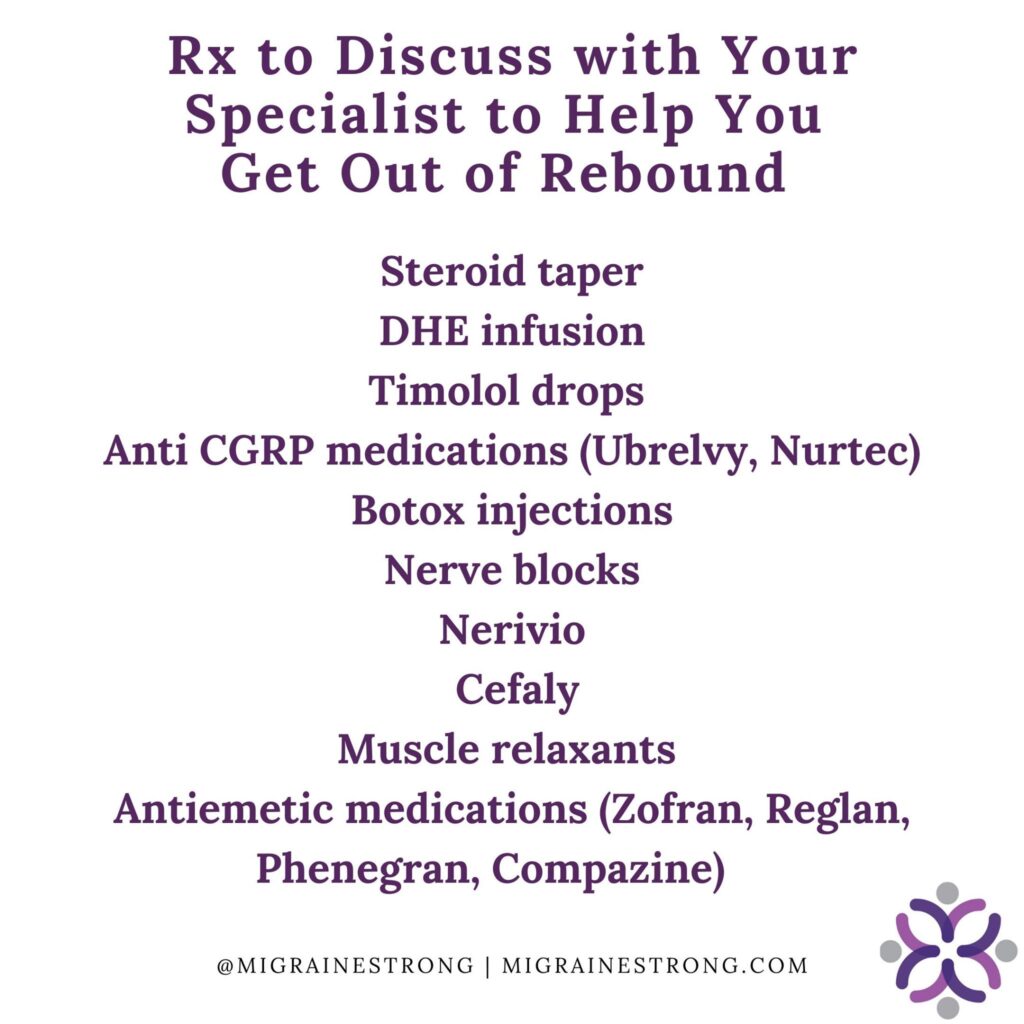
3. Do it now
There is no time like the present. When trying to find a time to get rid of your rebound headaches, it is easy to think of many reasons why doing so right now is not the best time. After all, you have to go to work, school, or have other engagements which cannot be rescheduled. You have to take care of your kids, your elderly parents rely on you, and you must manage your household. I get it. Life is always in the way and you cannot imagine having a migraine attack without being able to take your go to pain reliever. But chances are, your pain comes too often and your pain reliever is no longer working. Aren’t you already struggling every day or every other day? The sooner you get rid of your rebound headaches, the sooner you will start getting better. Make a plan. Call your doctor.
4. Stop all acute medications that got you into the rebound cycle**
If you are experiencing rebound headaches, the good news is that when you stop taking the acute medications that got you into rebound, the rebound headache cycle should stop. Stopping these medications, however, is very difficult. I have been there so I can absolutely relate.
I remember when I was experiencing daily migraine attacks I continued to take Excedrin Migraine on a daily basis even though it was no longer helping me. Sometimes it took the edge off my pain. Mostly, I was scared to go through an attack without medication. I was sure that if I did not medicate I would need to go to the emergency room. I felt comfortable knowing that if my attack got too severe I would go to the emergency room with my doctor’s note and her emergency plan for me. I was surprised that I could in fact get through an attack without medication. I got through all of my attacks without medications over the course of the next 5 months without the need to go to an emergency room.
** Consult your doctor before making any changes. Your doctor can and should support you in breaking the cycle. There are acute medications that are not associated with rebound. Additionally, there is a growing number of headache specialists that believe that you may only need to stop the class of medications that put you into the rebound cycle. For example, if sumatriptan (a triptan) put you in rebound, using naproxyn (an NSAID) properly may help you break the cycle. However, like in many areas of medicine, there are conflicting opinions. It cannot be said enough times- the expertise of a doctor skilled in managing migraine and rebound in essential.
Prescribed options to consider
Recently, anti-CGRP medications were approved that do not cause rebound. You may be able to continue to use them. Antiemetics and muscle relaxants may also be helpful.
I used prescribed Medrol dose pack for migraine and occipital nerve blocks, both of which decreased the severity and frequency of my attacks.[vi] Both of these treatments helped me significantly while I could not take any acute medications.
Botox is also considered a “bridge” therapy to get you through prolonged rebound cycles.
How long to get rid of rebound headaches?
This is everyone’s burning question! I have a vivid memory of researching how long rebound headaches last after stopping acute medication and not coming up with concrete information. I did my own research, asked my doctors, and spoke with people who have gone through the same thing in various migraine support groups. Although everyone’s experiences differed, the consensus was that it takes “months not weeks.”
According to American Migraine Foundation, “It may take from a couple of months to six months to eventually break the headache cycle.” [viii] Remember, it’s a marathon and not a sprint. Typically the worst part is over in the first week. How long rebound headaches last may also have to do with how long the person was in rebound, the type of medication(s) and individual variability.
5. Ask for and accept help
You do not have to do this alone. Ask family and friends to help you get through this time which you need to dedicate to your health. Explain to your loved ones the importance of getting rid of the rebound headaches now to improve your life. If you need help starting a conversation with your loved ones, send them this Open Letter to Friends and Family of People with Migraine.
Asking for help is not a sign of weakness. Nobody can do it all. We all need help sometimes and we should be willing to help others. At the Migraine World Summit live event in 2019, Dr. Dawn Buse reminded us that often our families and friends feel just as helpless and hopeless as we do and giving them a way to feel useful helps everyone. It may mean a lot to someone to be able to help, so if you need help, don’t deny them this opportunity.
My breaking point
When I was at my breaking point suffering daily attacks, my mom and sister offered to help by coming to stay with me on separate weeks. I accepted it with open arms because I needed the help. Their support and belief in me is what kept me going.
My mom again came to stay with me when I made the commitment to stop all acute medications in an attempt to get rid of the rebound headaches. My headache specialist prescribed Medrol dose pack for migraine which reduced severity of my head pain so that I did not need to stay in bed the entire time as I initially planned. Also, I did not need an emergency room visit. There were a few tough days but the pain eventually went away on its own.
We got through it one day at a time, but I would not have gotten through it without the help of my parents sister, husband, and in-laws, who were there ready to step in and help.
6. Attack migraine from all angles
It is important to remember that often migraine treatments do not work when someone is suffering from rebound headaches. In a study from 2009, it was even concluded that rebound headaches tripled the risk of an occipital nerve block failure.[vii]
However, once you stop the acute medications associated with rebound, it is also a great time to perfect your treatment plan. Whether it’s a preventive, Botox, a migraine diet, supplements, exercise or all of these, make sure you and your doctor come up with a plan where you attack migraine from all the angles.
Once I stopped my acute medications I began the Heal Your Headache diet. I continued taking my preventive medication and getting Botox even though my first trial failed. I was getting chiropractic treatment once a week. I started taking supplements: Magnesium Glycinate and Ginger.
My doctor and I set up my treatment plan so that once my body withdrew from the acute medications I had something helping my underlying migraine disease.
Rebound headache home remedies
When I was trying to get rid of rebound headaches over 4 years ago, I did not know about all the natural tools available that could have helped. Through the years, I have learned about so many rebound headache home remedies that can help get you through if your go to medication is not an option.
- Magnesium for rebound headaches – there are so many ways to get magnesium into our bodies! In addition to Pure Encapsulations magnesium capsules, which you can get at our Supplement Dispensary at a discount, you can also try trans-dermal magnesium. We recommend doing foot soaks with Life Flo magnesium chloride flakes in a warming bubbly foot spa for about an hour. We also like using Life Flo magnesium lotion and body wash.
- Ginger – Oh how we love ginger! Gin Gins ginger candies, Gaia Herbs Ginger Supreme capsules or Pure Encapsulations ginger capsules are all great options to use for pain and nausea. For many more strategies to relieve nausea check out our nausea relief blog loaded with tips. Our ginger blog explains why it is so helpful for migraine.
- Migraine Roller balls – essential oils help relieve symptoms like neck tension, nausea and head pain. Our favorite are Migrasoothe, Forces of Nature Migraine (get 20% with code NATUREMS19), Migraine Stick and straight peppermint oil.
- Allay Lamp – this is yet another tool that we can add to our toolbox to fight migraine attacks. It can help to alleviate light sensitivity, pain and nausea associated with migraine. You can use this link to receive 10% off the purchase price. More information is available in our review.
- Headache Hat – this Huggaroo headache hat is a microwaveable hat which is mainly used for hot therapy. It is versatile and can also be used for cold therapy if necessary. However, the cooling action is mild and lasts only 5-10 minutes; it is a secondary, bonus feature. It’s made of ultra plush minky fabric and filled with clay beads, flaxseeds, and 100% natural dried herbs (lavender, peppermint, chamomile, and lemongrass).
- Neck Wrap – this Huggaroo neck wrap can serve as a microwavable heating pad or a cold compress.
- Ice Head Wrap – this Hugarroo ice head wrap is used for cold therapy only. If ice provides relief during a migraine attack, this is a product for you. The hat contains 9 gel ice packs which provide long-lasting cooling action and remain flexible even when frozen. The hat is made from soft and plush fabric.
- Heating Pad – I love this Pure Enrichment Neck & Shoulder Heating Pad. Since neck pain is one of my migraine symptoms, this heating pad helps me so much when I am having an attack. This one is plush and doesn’t pill. It can wrap around your neck (or head) and is wonderfully comfortable. It also closes on the front with a magnetic closure so you don’t have to hold it when it stays closed around your neck.
- Meditation – there are many guided meditation apps available such as Calm, Inisight Timer and Headspace.
- CBD Oil – Currently there is a lot of different CBD oil brands on the market and it can be difficult and overwhelming to decide which one to try. We recommend joining Migraine Buds Facebook Group for advice about CBD oil to try. Take a look at our interview with Jodie Epstein if you are interested in the topic of Cannabis for Migraine.
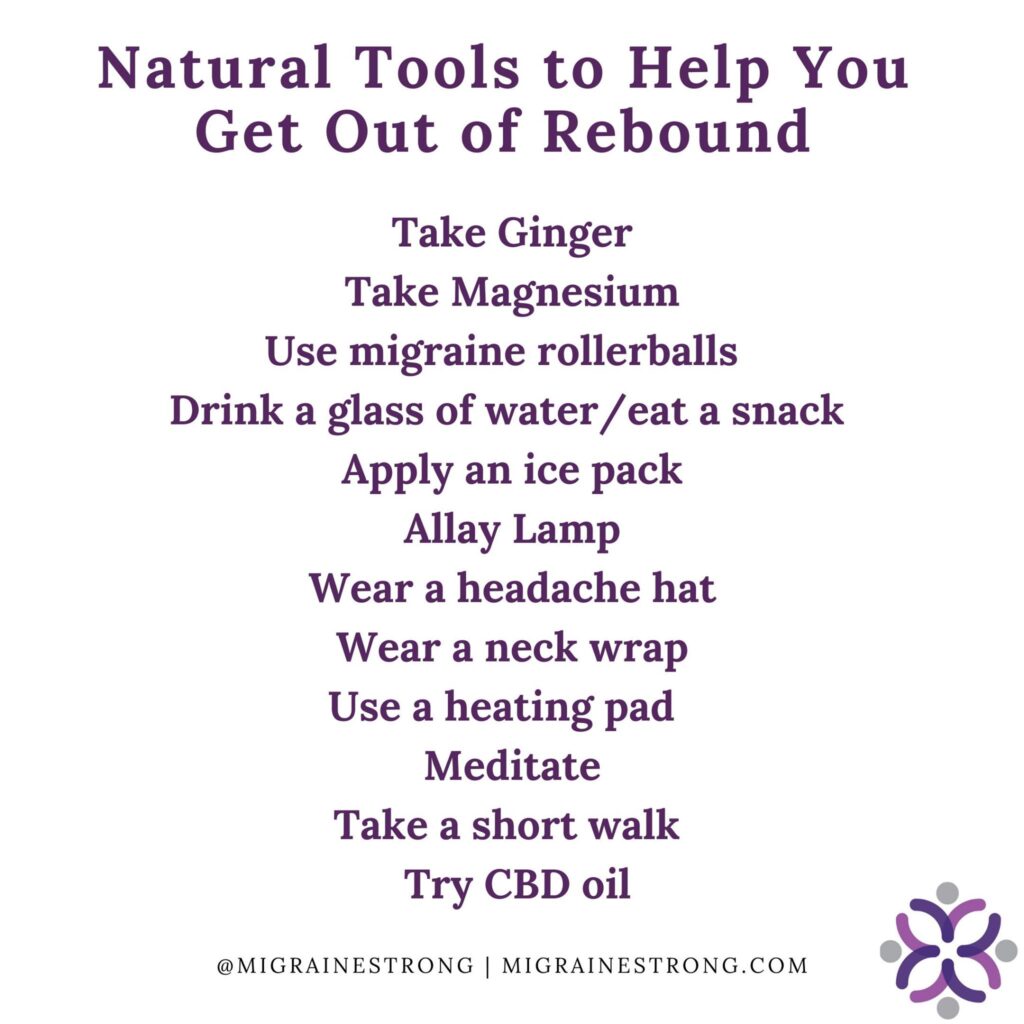
Words of hope and encouragement
Falling into the rebound headache cycle is not your fault. When we are in pain, it is natural to turn to medications to try to feel better. Do not feel ashamed or upset with yourself for taking medication which is meant to make you feel better. Do not feel ashamed for wanting your migraine attacks to go away so that you can get through your day, keep your job, or take care of your family.
If you are in a situation where the medications you took caused you to experience rebound headaches, there is a solution. Use your doctor’s expertise, your family’s support, social media’s supplemental information, and stop the overused acute medications associated with rebound. The longer you can go without these acute medications, the greater the likelihood that you will successfully get rid of rebound headaches. I am confident and hopeful that you can do this. And there is hope. I’m living proof of it.
Join our Migraine Strong Facebook Group if you need some support in getting through rebound while waiting for help from your doctor.
References:
[i] Practical Neurology
[ii] ICHD
[iii] AMF
[iv] Mayo Clinic
[v] Harvard Health Publishing
[vi] Wiley Online Library
[vii] Pubmed
[viii] American Migraine Foundation

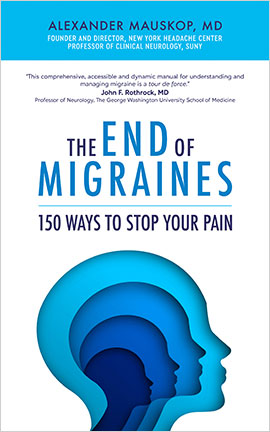
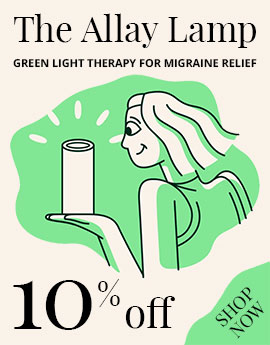
I found this post very helpful. I have been suffering from rebound headaches for years and this post has given me some good tips on how to deal with them.
I have been taking fioricet without codeine for 18 years since I had 2 brain surgeries & a lobectomy a year later. If I take it as prescribed, I do not get rebound headaches! The only time I have gotten rebound headaches is when I have taken more than my prescribed dose everyday!
Hi there, I completely understand how frustrating rebound headaches can be. I’ve been struggling with them for years and have tried so many different things without much success. It’s nice to see a post that offers some practical tips for managing them. I’m definitely going to try the coffee and caffeine limiting approach – thanks for sharing! 😊